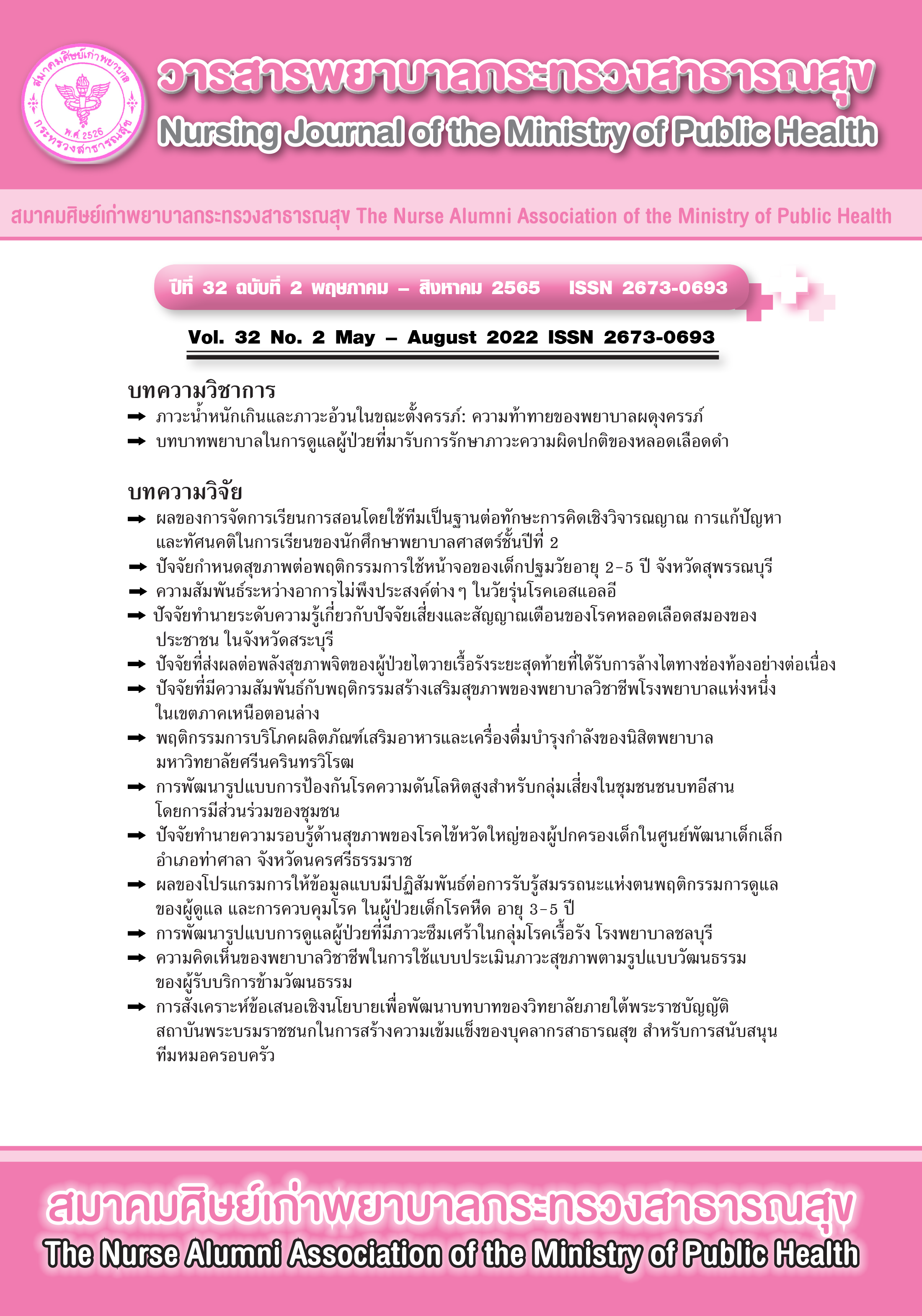The Development of a Care Model for Patients with Depression in Chronic Disease Chonburi Hospital
Main Article Content
Abstract
The aim of this research and development study were to develop a care model for patients with depression in chronic disease in Chonburi hospital and to investigate the outcomes of the care model. Three phases of research were conducted, including 1) situation analysis by reviewing medical records, nurse focus group discussions, and patient interviews, 2) development of the care model for patients with depression in chronic disease based on the Donabedian framework, and 3) outcome evaluation of the care model with the sample of 70 chronic disease patients and 110 professional nurses. The research instruments used were a depression assessment form, patient satisfaction assessment form, knowledge assessment form, compliance assessment form and the professional nurse satisfaction assessment form. The results showed that the care model for patients with depression in chronic disease, Chonburi hospital, consisted of 3 components: 1) structure: personnel, care guidelines, communication system, and outcome indicators, 2) process: announcement of a policy and deployment into practice, training on care guidelines, implementation of the care guidelines, communicating and monitoring outcomes, 3) outcomes: depression, satisfaction with the care model and safety from suicide attempts by patients, knowledge, guideline compliance, and satisfaction with the care model of nurses. After implementing the model, it was found that depression among chronic disease patients was significantly reduced at the .05 level. The patients had no thoughts of self-harm, no incidence of suicide and patients were satisfied with the care model at the highest level. The nurses had a statistically significant increase in knowledge at the .05 level, followed practice guidelines, and were more satisfied with the model than the target of 80% at a statistically significant level of .05.
Article Details

This work is licensed under a Creative Commons Attribution-NonCommercial-NoDerivatives 4.0 International License.
บทความและรายงานวิจัยในวารสารพยาบาลกระทรวงสาธารณสุข เป็นความคิดเห็นของ ผู้เขียน มิใช่ของคณะผู้จัดทำ และมิใช่ความรับผิดชอบของสมาคมศิษย์เก่าพยาบาลกระทรวงสาธารณสุข ซึ่งสามารถนำไปอ้างอิงได้
References
World Health Organization. Depression and other common mental disorders: global health estimates. Geneva: World Health Organization;2017.
Lortrakul M, Sukanich P. Ramathibodi psychiatry. 4th ed. Department of Psychiatry Science: Faculty of Medicine Ramathibodi Mahidol University; 2015.(in Thai)
Department of Mental Health. Handbook of training instructors on depression patient service system for nurses/public health academics. Nonthaburi: Ministry of Public Health;2015.(in Thai)
Jiang C Hong, Zhu F, Qin T Ting. Relationships between chronic diseases and depression among middle-aged and elderly people in China: a prospective study from CHARLS. Current Medical Science 2020;40(5):858–70.
Ould Brahim L, Lambert SD, Feeley N, Coumoundouros C, Schaffler J, McCusker J, et al. The effects of self-management interventions on depressive symptoms in adults with chronic physical disease(s) experiencing depressive symptomatology: a systematic review and meta-analysis. BMC Psychiatry 2021;21(1):584.
Kanchanapibulong A. Situation report of NCDs, diabetes, high blood pressure and related risk factors 2019. Nonthaburi: Department of Disease Control Ministry of Public Health;2020.(in Thai)
World Health Organization. Noncommunicable diseases [internet]. 2020 [cited 2021 April 17]. Available from: https://www.who.int/health-topics/noncommunicable-diseases#tab=tab_1.
Tisayakorn P. Because physical disease and depression are related [internet].2020 [cited 2021 April 17]. Available from: https://www.bodyandmindclinicbkk.com/bodyandmindconnection.(in Thai).
Nasif J. The emotional impact of chronic illness. Journal of Psychology & Clinical Psychiatry.2015;3(6):1-4.doi:10.15406/jpcpy.2015.03.00177.
Gürhan N, Beşer NG, Polat Ü, Koç M. Suicide risk and depression in individuals with chronic illness. Community Ment Health J.2019;55(5):840–8.
Department of Mental Health. 5-year government action plan (2018-2022) [internet]. [cited 2021 April 17]. Available from: https://www.dmh.go.th/intranet/p2562 /government action plan %205%20years%20Department of Mental Health%20(B.E.%202063-2565) %20(1).pdf.(in Thai)
Ministry of Public Health. Policy of the ministry of public health in 2021[internet]. [cited 2021 April 17]. Available from: https://www.moph.go.th.(in Thai)
Chonburi Hospital. Statistical report of Chonburi hospital service recipients for the year 2020. Chonburi: Chonburi Hospital;2020.(in Thai)
Chonburi Hospital. The incident report patient committed suicide in Chonburi Hospital. Chonburi: Chonburi Hospital;2019.(in Thai)
Donabedian A. An introduction to quality assurance in health care. New York: Oxford University Press;2003.
National Health and Medical Research Council. A guide to the development, implementation and evaluation of clinical practice guidelines: how to put the evidence into practice: implementation and dissemination strategies toolkit 4. [Internet]. 2000 [cited 2021 Jun 3]. Available from: http://nla.gov.au/nla.obj-790831275.
Chaiwut G. Nursing practice for depression screening in chronically ill patients, in-patient department, Santisuk Hospital, Nan Province [Master of Nursing Science in Mental Health and Psychiatric Nursing]. Chiang Mai: Chiang Mai University;2009.(in Thai)
Sukaram S, Nimitanan N, Rujanavej S. Effects of a multidisciplinary team’s collaborative care program on the prevention of depression in patients with type 2 diabetes. Journal of the Royal Thai Army Nursing 2018;19(special):251–61.(in Thai)
Mantasuot N, Sakulphan S, Tapinta D. Effect of problem-solving therapy program on depression among patients with end stage renal disease receiving hemodialysis. Nursing Journal 2020;47(1):301–12.(in Thai)

